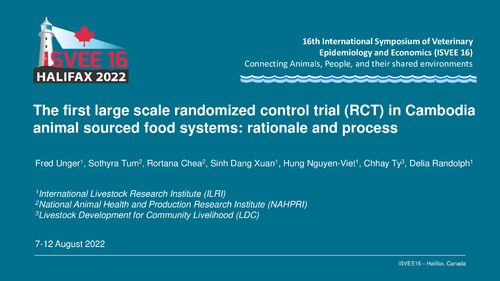The first large scale randomized control trial in Cambodia animal sourced food systems: rationale and process
Abstract
Objectives:
The aim of the abstract is to share rationale, processes, experiences including challenges made
during the implementation of a RCT to improve food safety in traditional pork retail in Cambodia.
Material and methods:
The RCT was part of an operational research conducted under the framework of the Safe Food Fair
Food Cambodia Project implemented by the International Livestock Research Institute in partnership
with Cambodian and international partners. It is considered as the first large scale RCT in Cambodia
animal sourced food systems. The RCT was implemented across six provinces, each province two
control and treatment markets and up to fifteen retailers per selected market.
Results:
The RCT was designed over a period of approximately six months. This included an in-depth
participatory diagnostic with national partners on feasible intervention, selection of provinces and
markets, required training and staff needed. In consecutive steps training materials were designed,
low-cost equipment agreed and procured (value 25-30 USD). Implementers at provincial level
included market managers and local veterinary services. In each of the six province 6-8 local staff
was identified consisting of market manager and vets in addition to members of the research team.
The RCT was conducted over a period of 6 weeks, this included training, observations of hygienic
practice and use of hygienic indicators. Challenges included variations of markets in terms
infrastructure, limited information of operating retailers per market and some delayed analysis of
RCT results.
Conclusions:
Important for the success of the RCT (significant hygienic improvements) was the profound
preparation (participatory diagnostic) and dedicated support of local authorities prior and throughout
the trail. Intervention packages were taken up by national authorities in form of modified guidelines.

